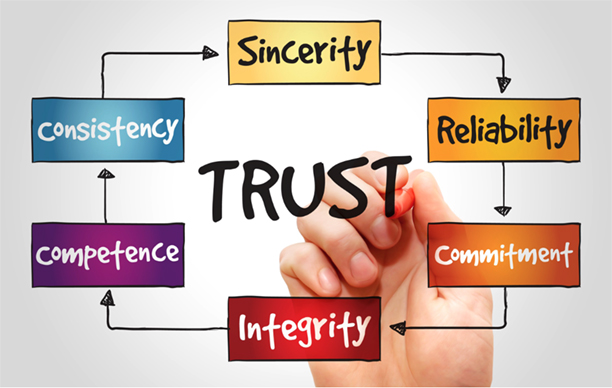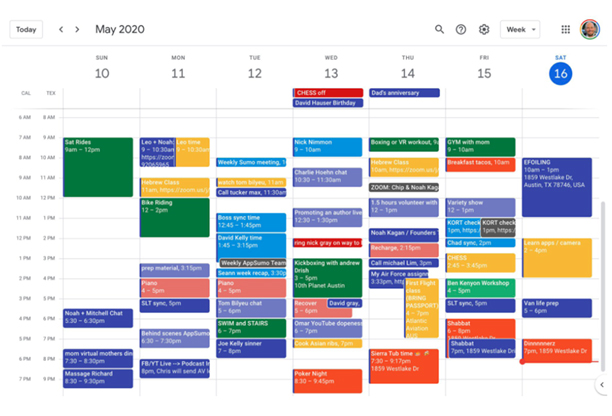By Alyssa Fox | Fellow
Reliability fosters trust and yields results. Follow these important steps to boost your own reliability as a valued contributor.
In a world of information bombardment, ever-decreasing attention spans, and the curse of busyness, I’ve noticed a trend that’s becoming glaringly more prevalent—unreliability. It starts as a little thing here or there—not answering some emails, forgetting a deadline, being consistently late to events. But before you know it, even your best intentions can’t hide the fact that you’ve lost track of your commitments.
Reliability isn’t talked about much when people discuss soft skills, so you might be asking, “Is it really that big of a deal?” Well, yes, it is. Reliability is one of the vital parts of building trust. And trust is the backbone of all relationships. Though I focus on the professional aspects of unreliability here, you can apply most of these points to your personal life as well.
What Is Reliability?
What does it mean to be reliable? Per Dictionary.com, reliable means “…that may be relied on or trusted; dependable in achievement, accuracy, honesty, etc.” I especially like this definition because it includes both trust and dependability. Synonyms include trustworthy, consistent, and authentic. For me to rely on you, I need to be able to trust that you will do what you say you will, when you say you will, in a consistent manner.
Too often we talk about the hard skills one needs to perform their job well—knowledge in your domain, technology expertise, or a certain education. But soft skills affect your work as much as, if not more than, hard skills. We don’t create work products in a vacuum—we must interact with our colleagues to make products, deliver services, and run businesses. Soft skills can be applied in any job, anywhere, and reliability should be at the top of that list.
Why should you care? Because the impact is greater than you think. On your colleagues, on your family, and on yourself. If you find that you struggle with keeping up with your appointments or tasks, or get constant reminders from others because you’re not delivering, read on.
How Unreliability Affects Others
When you don’t deliver, it has a ripple effect on the people around you.
- It wastes their time. If you’re repeatedly late for meetings, your colleagues spend an unknown amount of time sitting around waiting on you. They could have been doing something they chose to do, rather than having their time controlled by you. Additionally, have you ever added up the cost of all those people sitting there for 15 minutes just waiting? Those wasted dollars are not something your CFO wants to see.
- It causes them more work. Think back on a time you’ve worked with someone who is unreliable. How often do you have to follow up with them to try to get answers out of them? How often did you just step in and do something yourself rather than waiting for them to do it because you never heard back from them? Neither scenario is pleasant and adds to what is probably an already too-heavy workload, causing resentment along the way.
- It can negatively influence others to do the same thing. The more people see others not responding, arriving late, or not delivering when they say they will, the more likely it is they will start doing the same thing, having a snowball effect across your organization.
- It degrades the work product and costs money. Often, unreliability is a symptom of being overwhelmed. If that’s the case, your work product will have lower quality due to your attention being dispersed among too many things. If you’re constantly receiving reminders from your colleagues and trying to keep up with those, it’s likely you’re unable to take the time to see the bigger picture of how all the pieces of the product fit together. This focus on the overwhelm could cause some pieces to fall through the cracks. The back and forth, the slips in the product, the late delivery—it all costs your organization money.
How Unreliability Affects You
In the short-term, being unresponsive might not affect you much, but over time it adds up and impacts your professional future.
- It overshadows your intention. Regardless of your plan to respond or deliver what you say you will, if you repeatedly don’t, even your best intentions get lost in the muddle. People typically give you the benefit of the doubt if you miss a deadline irregularly, but if it’s a common thing, they stop listening to your declarations of what you’ll do and no longer trust you.
- It changes your reputation. Building strong workplace relationships is essential to your success in an organization. If you are reliable, your coworkers depend on you because they know you’re a consistent performer. If you’re not reliable, your reputation shifts, labeling you as someone people don’t necessarily want to work with. Unreliability can also paint you as disorganized and thoughtless.
- It affects the perception of your capacity for more responsibility. The more responsibility you can take on, the more valuable you are to your employer. If you show yourself to be consistent in your responsiveness and delivery, it’s likely you’ll be given more interesting and more visible projects, as well as have the opportunity to lead or manage others. If you can’t reliably deliver at your current level of responsibility, you’re certainly not going to get more.
Demonstrating Reliability
While reliability is in and of itself a skill, there are several other traits and skills that tie into it and help you demonstrate you can be trusted.
- High work quality. While one can certainly be relied upon to deliver shoddy work, people typically associate reliability with consistency around high-quality work.
- Time management. Being on time with your deadlines and deliverables requires a solid understanding of the tasks on your plate and the ability to allocate hours to those tasks in a way that makes the best use of your time.
- Responsiveness. Communicating where you are on a task early and often keeps others in the loop on requests that they’ve made of you or joint projects.
- Planning skills. Being reliable requires realistic estimates for a project and contingency plans. If you approach a situation haphazardly, it will be more difficult to put things in perspective and prioritize accordingly.
Possessing and demonstrating reliability is increasingly essential in a new work world shaped by the pandemic and economic shifts. CareerAddict highlights that businesses are depending more on remote workforces and asking employees to do more and more. Therefore, your reliability can garner you such benefits as promotions, more pay, and more opportunities.

Tips for Being More Reliable
If you recognize that perhaps you’re not as reliable as you’d like to be, don’t despair. You can take some easy steps to improve your dependability.
Don’t Overcommit
We are all bombarded with requests from others: to volunteer, for our money, for our thoughts or time. Practice pausing before you say yes to any of these requests, and ask yourself:
- What is the time commitment required? Is it a one-time thing? Recurring? Ongoing and for how long?
- Am I qualified to carry out this request, or is there someone else who’s more appropriate?
- Is this an area of interest for me?
- Does this help me achieve my personal or professional goals?
Prepare—Thoroughly and Specifically
Know what you need to accomplish each task, then make a plan for accomplishing the task, working backward from your deadline. When planning, make sure you set specific steps in your plan, rather than generalizations that are hard to measure. For example, if you are writing a white paper, rather than announcing that your intention is to “write a white paper by December 20,” make a plan that includes steps and dates for gathering information from subject matter experts, writing the first draft, getting the draft reviewed, and so on through the completion of the paper.
Check your calendar at the end of each workday so you know what’s coming the next day. Read the materials ahead of the meeting. Leave buffer time between meetings to walk to the next conference room. It really is the little things that help here.
Find a Way to Organize Yourself
Write things down. Let me say that again. Write. Things. Down. We all think we can remember things, but there’s so much going on nowadays that we just can’t. So why exert the mental energy on these things when we have a simple solution—calendars, notebooks, and spreadsheets?
A calendar can be your best friend in managing your various commitments, responsibilities, and down time. If you don’t schedule things on your calendar, especially in the personal arena, they will fall off your radar. Everyday life sneaks up on you sometimes, and if you don’t have the visual reminder of your various commitments, weeks will go by and you’ll realize you’ve done all the things you had to do, but none of the things you wanted to do.
I prefer to keep all of my personal, professional, and volunteer events on a single calendar so I don’t double-book myself without realizing it (it’s happened). Even if you maintain separate calendars for each of these areas, find a way to view all of the calendars at once so you can see everything you have scheduled for a particular day. You can also color-code your calendar if that helps you organize yourself.
Use spreadsheets and notebooks to organize your work. Look into apps and tools that make you more organized and productive. The better handle you have on your responsibilities, the more likely it is you’ll be able to respond quickly and deliver on time because the information you need is at your fingertips. Check out nTask’s list of the 65 best organizational tools for work, and ideas from Inc. for your personal life.

Communicate More
Often, people fall into the trap of not responding to others because they don’t have the answer yet. I suggest that if it’s been a couple of days, let the requester know you’re still working on it and will get back to them shortly. Though you might not be able to help them just yet, this proactive communication lets them know you haven’t forgotten them and saves them the trouble of having to follow up.
If you know you can’t deliver something by the time you said you would, let people know early so they can adjust their plans accordingly. Be proactive and think about what helps move the work forward, rather than doing nothing and keeping projects stagnant. Additionally, be honest about mistakes along the way. Being upfront about a misstep and addressing the problem quickly indicates that you’re open through the whole process and that your focus is on the end goal. Communicate. All the time. We must let people know what we’re doing, why we’re doing it, or what we might need to do instead.
Conclusion
Reliability is essential to having a good reputation, to building relationships that are long-lasting, and to garnering more trust in your organization. The first time you drop the ball, you might get a second chance. Maybe even the next time. But beyond that? Your reputation is tarnished. Dale Carnegie wrote in How to Win Friends and Influence People that you need to be genuinely interested in other people to accomplish the titular goal. And what better way to show your interest than to demonstrate that people can rely on you to be responsive and deliver consistently. Be their go-to person. Build the trust. And enjoy the stronger relationships and winning results that reliability yields.
 Alyssa Fox is a content strategist and marketing leader who thrives on improving customer experience through strong relationships and tailored content strategies. With extensive experience in technical and marketing content, Alyssa has a passion for leveraging content as a business asset to drive demand, revenue, and customer retention. She is a member of the American Marketing Association and past president of the Society for Technical Communication. Alyssa is an STC Fellow and has served many roles in the society. She speaks at conferences around the world about leadership, strategy, marketing, and content. She loves traveling, reading, eating out, and good grammar.
Alyssa Fox is a content strategist and marketing leader who thrives on improving customer experience through strong relationships and tailored content strategies. With extensive experience in technical and marketing content, Alyssa has a passion for leveraging content as a business asset to drive demand, revenue, and customer retention. She is a member of the American Marketing Association and past president of the Society for Technical Communication. Alyssa is an STC Fellow and has served many roles in the society. She speaks at conferences around the world about leadership, strategy, marketing, and content. She loves traveling, reading, eating out, and good grammar.


